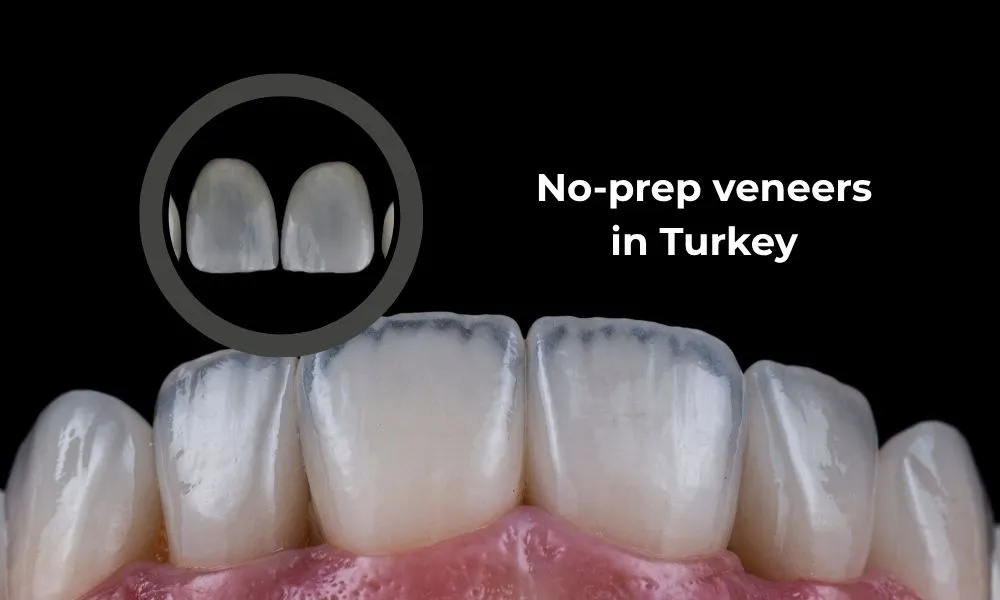


No prep veneers are the bonding of veneers onto natural teeth by means of a special adhesive. Antalya No prep veneers are glued directly because they have a very thin structure. No processing is done on the tooth enamel, only adhesive is used. This makes it reversible. However, clinics cannot guarantee that they are 100% reversible. In general terms, you can remove your veneers after a while.

For conventional veneers (emax veneers, laminate veneers, etc.), some enamel is reduced of the tooth enamel is performed. In this way, tooth defects are well concealed and patients have more robust and durable veneers. Since these veneers have a thicker structure, if they are bonded to the teeth without preparation, they cause a very rough and bulky appearance. The teeth lose their natural appearance. At the same time, local anaesthesia is applied in the traditional veneer process and the natural tooth structure is permanently altered. If your dental veneers become deformed over time, you will need a new veneer treatment.
In contrast, no prep veneers are applied over the enamel due to their ultra-thin structure and continue to preserve the natural tooth appearance. These veneers are completed in a shorter time as no preparation is required. In order to receive No prep Turkey treatment, your teeth should not be too worn out. Since these veneers are 0.1 -0.2 mm thick, they may not fully cover dental imperfections.

No prep veneers hide mild dental problems because they are ultra-thin. They are applied to individuals who are in good general health and have completed their oral and dental development.
Candidates who are not suitable for No prep veneers are people with moderate tooth alignment problems, dark yellow stains and severely damaged teeth. These candidates may prefer Antalya emax veneer or emax crown treatments.
Ultra-thin veneers are a safe dental treatment method. There is no shaving of the tooth enamel, which reduces the risk of complications in the long term. In addition, there is no tooth sensitivity even in the short term. A thorough dental assessment is essential to ensure that veneers adhere securely and function properly.
While the life of no prep veneers made of porcelain is more than 10 years, those made of composite resins have a life span of approximately 7 years. Porcelain veneers are more durable because they are hard, long-lasting, and have a smooth surface. Other factors that support the longevity of no prep veneers include regular dental care and avoiding the habit of biting hard objects.
If cracks or breaks occur over time, your veneers can easily be replaced.
If you want to have long-lasting veneers in Turkey, contact Professor Sinan Tozoğlu and his team to refresh your smile.
Ultra-thin veneers in Turkey are a painless procedure. No anaesthesia and no preparation phase are applied during the treatment. No-prep veneers are ideal for patients with dental anxiety or who want to avoid painful dental procedures.
Yes, when you get your no prep veneers, you can choose the shade, and shape of your teeth, just like in other veneer treatments. Turkish dentists will guide you through this process, and 3D scanning devices will help you make a more accurate decision. Also, you can choose your tooth shape to achieve a square, hollywood, natural, round appearance.
In order to use no-prep veneers for many years, you should follow a detailed and careful dental care routine. Don't worry—it's a simple process. In fact, it is an issue that we need to apply for our healthy teeth, but we do not pay much attention to it. This procedure is as follows:
Brush your teeth with a soft brush twice a day, morning and evening. The brushing process should be from the gum and with a sweeping motion. Then use an interdental brush, water floss, or dental floss to thoroughly clean between the veneers and the tooth eruptions. Use a tongue scraper to remove bacteria from your tongue, and finally rinse with a mouthwash (preferably alcohol-free).
When you perform this routine on a daily basis, you will already take good care of the veneers. In addition, you can visit your dentist once or twice a year for professional cleaning and polishing.
One last step to protect your veneers. That is, do not bite too hard food or objects. Although porcelain veneers are durable, they cannot withstand such strong pressure and get damaged. If you take good care of them, they will be with you for years.